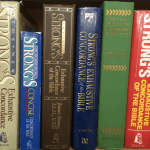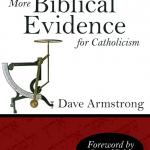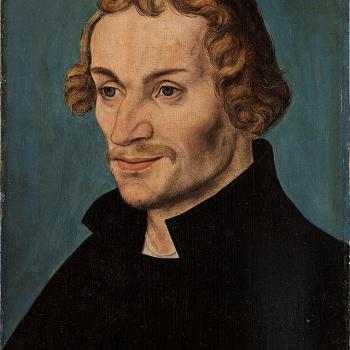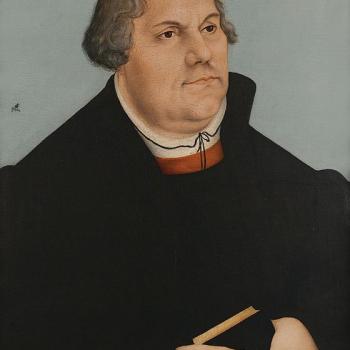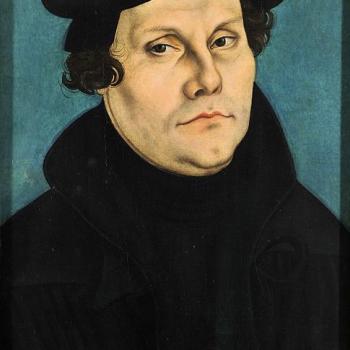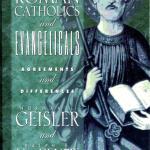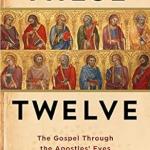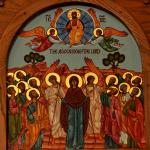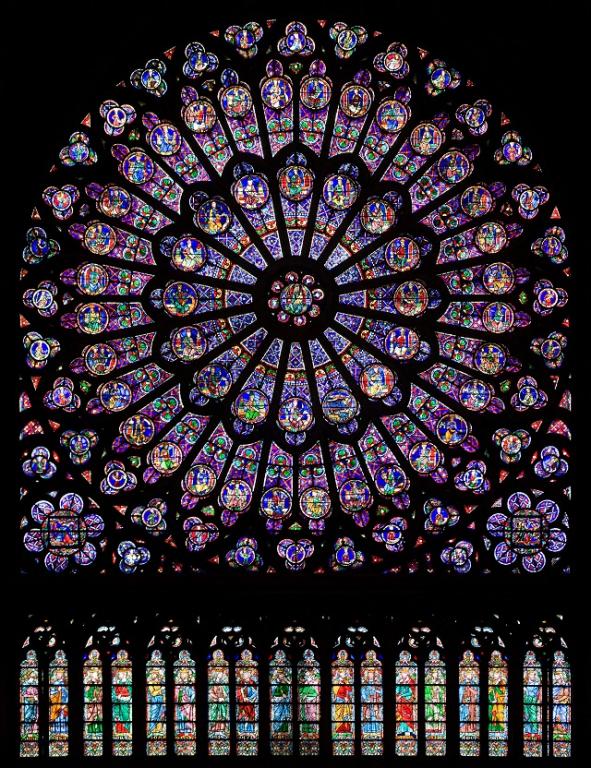
(12-11-04)
***
This is a counter-reply to a response to my best-selling pamphlet for Our Sunday Visitor, Top Ten Questions Catholics Are Asked, by Church of Christ preacher Kevin Cauley. His words will be in blue. Words from my pamphlet will be in green.
***
Part III of the series
***
Complete Five-Part Series:
Part I: Introduction and Church of Christ Information
Part II: Tradition / Papacy
Part III: “Father” / Purgatory / Statues / Confession
Part IV: Mary / Eucharist
Part V: Salvation (+ Purgatory Again)
***
III. “Why do you call your priest ‘Father’?”
1. Catholicism says . . .
1) They cite Matthew 23:9 which says, “And call no man your father on earth, for you have one Father, who is in heaven.”
2) Then they say, “In this passage, Jesus is teaching that God the Father alone is ultimately the source of all authority. But he is not speaking absolutely, because if so, that would eliminate even biological fathers, the title ‘Church Fathers,’ the founding fathers of a country or organization, and so on.”
3) They go on to say that Jesus uses the term father in regard to Abraham and Paul uses the term to describe himself in his relationship with Timothy in 1 Cor. 4:15.
2. What does the Bible say?
1) Matthew 23:5-10 says, “But all their works they do for to be seen of men: they make broad their phylacteries, and enlarge the borders of their garments, And love the uppermost rooms at feasts, and the chief seats in the synagogues, And greetings in the markets, and to be called of men, Rabbi, Rabbi. But be not ye called Rabbi: for one is your Master, even Christ; and all ye are brethren. And call no man your father upon the earth: for one is your Father, which is in heaven. Neither be ye called masters: for one is your Master, even Christ.”
2) We agree that this passage is not talking about “fathers” in any of the senses that they listed.
a. Biological fathers.
b. Ancestral fathers.
c. Founding fathers.
d. Even fathers in the faith.
That’s an irrelevant factor, because the position is against calling anyone “father.” That would include priests or anyone else who is called by that title, if indeed the passage is interpreted hyper-literally, as anti-Catholics do, since (with that approach) the passage doesn’t teach that only teachers or clergymen can’t be called “Father.”
3) We disagree that this passage is talking about God as our authority.
4) This passage discusses religious elitism and the sin in so calling someone by the religious title of Rabbi, Teacher, Father, Master.
5) So they fail to achieve what they need to achieve from this passage and still stand condemned.
Okay, so Mr. Cauley wants to argue that no religious figure, clergyman, Christian teacher, elder etc., ought to be called any of these four titles, based on Matthew 23:5-10? That’s extremely interesting, since John the Baptist was called “Rabbi” in John 3:26 (RSV, KJV), and he registered no protest at this outrageous “religious elitism.” I guess John didn’t understand this simple teaching of his Master, Jesus Christ and was a religious elitist himself, according to Mr. Cauley’s exegesis.
Even he notes that Paul referred to himself as “father” in 1 Corinthians 4:15. If Paul calls himself that, obviously others can call him the same thing. In my pamphlet I noted that he called Isaac “our forefather” in Romans 9:10. So Paul fails to understand what Mr. Cauley and the church of Christ does. He clearly must be an “elitist” himself, and urges the same practice upon others by suggesting these outrageous titles. Jesus also refers to a disciples’ and servants’ “teacher” and “master” twice, in two consecutive verses: Matthew 10:24-25. Jesus called Nicodemus a “teacher of Israel” (Jn 3:10; RSV / “Master” in KJV). The logic is very simple:
1) Jesus refers to the “master” and “teacher” of a disciple or servant.
2) Therefore that servant / disciple can refer to the same person(s) as “master” or “teacher” — since Jesus already did.
3) But Mr. Cauley informs us that this practice is a “sin” and “religious elitism.”
4) Therefore, our Lord Jesus is guilty of “sin” and “religious elitism.”
5) But that is blasphemy, and no Christian believes that (including the “churches of Christ”).
6) Therefore, either (a) Mr. Cauley is mistaken, or (b) Jesus is a sinner and religious elitist (along with Paul and John the Baptist), or (c) the Bible contains many errors, since it presents these scenarios that simply can’t be, according to Mr. Cauley.
7) Most Christians would vastly prefer (a) to (b) or (c).
8) Therefore, Mr. Cauley’s statement: “This passage discusses religious elitism and the sin in so calling someone by the religious title of Rabbi, Teacher, Father, Master,” is (extremely likely to be) false and must be rejected as a lie from the devil. To use his words, he “still stands condemned,” insofar as he urges this argument from the Bible.
If it is a “sin” to use these titles of address, then why do John, Paul, and Jesus do so? This position is so incoherent and self-defeating as to be almost beneath the dignity of a reply, but I have offered a brief one so no one will be led astray by this specious “reasoning” and biblical “exegesis.”
IV. “Why do you pray for the dead?”
1. Catholicism says . . .
1) “The Bible teaches the rightness of prayers for the dead….”
Just for the record: in my pamphlet, the word “clearly” was between “Bible” and “teaches.”
2) They cite 2 Maccabees 12:40ff, 1 Cor. 15:29, and 2 Timothy 1:16-18.
2. The Bible says . . .
1) First, the book of 2 Maccabees is not even part of the Bible and holds no authority whatsoever.
Catholics believe it is, because the early Church did (as Protestant Church historian and patristics expert J. N. D. Kelly confirms), but that is another lengthy discussion. I can prove the rightness of the practice from the NT anyway.
2) 1 Cor. 15:29 speaks of “baptism for the dead” and has nothing to do with prayer. It is an incredible stretch to say that because Paul spoke of baptism for the dead that therefore we can pray for the dead.
This is an elaborate argument involving comparison of Scripture with Scripture, which I have dealt with elsewhere (see my paper: 1 Corinthians 15:29 and “Baptism for the Dead”: What Does it Mean?). What would Mr. Cauley, then, say that Paul is referring to? It is no less against Protestant principles and beliefs to be “baptized for the dead” (whatever in the world that is — from their perspective –, Paul is talking about) than praying for the dead. I made an exegetical argument elsewhere. Mr. Cauley, however, simply makes bald statements.
This passage remains for Protestants one of the most difficult in the Bible to exegete and interpret. The Presbyterian commentator Matthew Henry called it a “very obscure passage.” Methodist expositor Adam Clarke stated that it was “certainly the most difficult verse in the New Testament.” I argue in my latest book that it is only so because Protestants refuse to allow the traditional Catholic interpretation. Their own false theological presuppositions, which forbid what the Bible and the early Church allowed, cause the difficulty.
3) 2 Timothy 1:16-18 says, “The Lord give mercy unto the house of Onesiphorus; for he oft refreshed me, and was not ashamed of my chain: But, when he was in Rome, he sought me out very diligently, and found me. The Lord grant unto him that he may find mercy of the Lord in that day: and in how many things he ministered unto me at Ephesus, thou knowest very well.” There is NO indication in this passage that Onesiphorus was dead.
Why, then, do the following Protestant commentators believe he was (or probably was) dead, if it is so “clear” to Mr. Cauley, that he is not?:
a) New Bible Commentary (possibly)
b) A.T. Robertson (“apparently”)
c) International Standard Bible Encyclopedia (possibly)
Even Matthew Henry didn’t rule it out, since he stated he was probably not dead. In any event, I didn’t have this information in my pamphlet, but there are definitely prayers for the dead in the NT: our Lord Jesus prayed for the dead man Lazarus (Jn 11:41-42), as did St. Peter for the dead disciple Tabitha (Acts 9:36-41). This is why we do it, too, because it is the witness of the Bible and also the early Church.
V. “Why do you pray to idols (statues)?”
1. Catholicism says . . .
1) “No Catholic who knows anything about the Catholic faith has ever worshipped a statue (as in pagan idolatry).
2) They justify their statues by saying, “Statues are simply a visual reminder of great saints and heroes of the faith….”
3) Let me say that I find it hard to believe that bowing down in front of statues and kissing their toes are not acts of worship.
Worship is an interior disposition. One simply doesn’t know what the person intends by acts such as these without asking them. People bow before a picture of an accident victim placed at the scene of their death. I’ve seen many people kiss a dead person in a casket. That is not longer that person, lying there, but obviously to the person doing it, they represent the person that used to be. Is this worship, too?
I’ve seen many people bowing down in repentance at the “altars” of Protestant churches, sometimes at the foot of a pastor or someone praying for them. Is that worship? Or do those persons represent God at those moments, coming to offer forgiveness to the repentant sinner? One can easily imagine a person kissing a photograph of their son, a soldier recently killed in combat. Are they worshiping him?
4) The big toe of Peter in St. Peter’s Basilica in Rome has been completely rubbed off over the centuries because of people kissing it.
That’s fine, but irrelevant unless the necessary questions above are considered.
2. The Bible says,
1) Exodus 20:4, 5 “Thou shalt not make unto thee any graven image, or any likeness of any thing that is in heaven above, or that is in the earth beneath, or that is in the water under the earth: Thou shalt not bow down thyself to them, nor serve them: for I the LORD thy God am a jealous God, visiting the iniquity of the fathers upon the children unto the third and fourth generation of them that hate me;”
2) 1 Cor. 5:11 says idolaters will not inherit the kingdom of heaven. Eph. 5:5 says that covetousness is idolatry, so just because it is not like ancient paganism doesn’t mean something can’t be an idol!
We wholeheartedly agree that idolatry is a grave sin; we deny with equal vigor that we are doing it! The reasons are difficult to explain to Protestants because of the multiplicity of erroneous assumptions that they have about our practices and idolatry and worship in general, so I refer those interested in learning more to my many papers on these topics.
VI. “Why do you confess your sins to a priest?”
1. Catholicism says,
1) “Jesus gave His disciples–and by extension, priests–the power not only to ‘loose’ sins (that is, forgive in God’s name), but also to ‘bind’ (that is, impose penances) . . . .” They cite Matthew 18:18 “Verily I say unto you, Whatsoever ye shall bind on earth shall be bound in heaven: and whatsoever ye shall loose on earth shall be loosed in heaven.” as justification for this as well as Matthew 16:19.
2) They cite John 20:23 as justification for forgiving sins on earth. “Whose soever sins ye remit, they are remitted unto them; and whose soever sins ye retain, they are retained.”
3) They cite Matthew 3:5-6, Acts 19:18 and 1 John 1:9 as authority for priests to take confessions.
2. The Bible says . . .
As throughout my pamphlet, the “Bible says” lots and lots of things (we see the six passages I offered in support of my views above). But Mr. Cauley blows off what the “Bible says” when it disagrees with his preconceived theology. Catholics are (praise be to God) free to follow the Bible wherever it goes, and to yield to it, rather than to traditions of men, as with the “churches of Christ.”
1) All Christians are priests! 1 Peter 2:5 “Ye also, as lively stones, are built up a spiritual house, an holy priesthood, to offer up spiritual sacrifices, acceptable to God by Jesus Christ.” 1 Peter 2:9 says we are a royal priesthood.
In the sense in which these passages mean it, yes they are. But it is not referring to the priestly function of offering the Mass and dispensing the sacraments. Thus, only ordained priests may “bind” and “loose” in this fashion, because that is their function as a priest. This is clearly shown in the actions of the Apostle Paul. I wrote in my first book, A Biblical Defense of Catholicism (pp. 163-164):
1 Corinthians 5:3-5 / 2 Corinthians 2:6-8,10-11
. . . I have already pronounced judgment in the name of the Lord Jesus on the man who has done such a thing. When you are assembled, and my spirit is present, with the power of our Lord Jesus, you are to deliver this man to Satan for the destruction of the flesh, that his spirit may be saved in the day of the Lord Jesus. {see 5:1-2}
For such a one this punishment by the majority is enough; so you should rather turn to forgive and comfort him, or he may be overwhelmed by excessive sorrow. So I beg you to reaffirm your love for him . . . Any one whom you forgive, I also forgive . . . in the presence of Christ, to keep Satan from gaining the advantage over us; for we are not ignorant of his designs.
St. Paul in his commands and exhortations to the Corinthians . . . binds in 1 Corinthians 5:3-5 and looses in 2 Corinthians 2:6-7,10 . . . He forgives, and bids the Corinthian elders to forgive also, even though the offense was not committed against them personally. Clearly, both parties are acting as God’s representatives in the matter of the forgiveness of sins and the remission of sin’s temporal penalties . . .
2) Revelation 5:10 says, “And hast made us unto our God kings and priests: and we shall reign on the earth.” Who are these? The ones who have been redeemed as verse 9 indicates.
In the limited sense of the similar verses offered above. There is often more than one sense of a word in Scripture. That’s nothing unusual at all.
3) Sin is committed only against God and so God alone can forgive sins. Psalm 51:4 “Against thee, thee only, have I sinned, and done this evil in thy sight: that thou mightest be justified when thou speakest, and be clear when thou judgest.”
Of course. Every priest who forgives sins is acting as a representative or agent of God. God forgives sins that are committed against others (one can sin against other people, not just God, as Mr. Cauley falsely states, but every sin also breaks God’s law, and is against Him as well). We see Paul above forgiving as person who didn’t sin against him. He was “binding and loosing”; rabbinical functions which were carried over into Christianity, because they were instituted by Jesus Himself.
4) What then is the Bible speaking about when talking about the disciples forgiving sins? Certainly not some formal clergy of priesthood that requires the sinner to confess sins to the priests to get forgiveness.
Then how does Mr. Cauley explain what Paul did, in the passages above? He imposed penance on the man (much like a priest does in confession) and then urged his brethren to forgive him and receive him back into fellowship. He himself admits that the disciples forgave sins. So what in the world were they doing? Hopefully, he will inform us.
5) The context of Matthew 18 is in regard to personal sins against brethren.
That’s correct, but then, what did Jesus mean when He said to His disciples (whom He was talking to here), “”whatever you bind on earth shall be bound in heaven, and whatever you loose on earth shall be loosed in heaven” (Matthew 18:18)? It’s fine and dandy to be a skeptic and shoot down the other guy’s argument all day long (or purport to), but in the end one has to offer alternative exegesis and arguments. One has to present a positive apologetic and theology, not just a negative condemnation.
6) The context of John 20:23 is in regard to the work of the Apostles on the earth.
Oh, I see, so is Mr. Cauley contending that the apostles could bind and loose and forgive others’ sins, but then after they died, no one else could ever do so? One can’t claim, on the one hand, that “we are all priests, so all this stuff applies to everyone,” then turn around and limit another very similar passage solely to apostles, without expositing either, and with no plausible principle of differentiation. This is the very essence of eisegesis and special pleading: scattershot analysis with no internal coherence or strength or “recommendation” other than that it disagrees with Catholic teaching. Such a method in effect hoodwinks the listener or reader into accepting things that are fairly easily refuted by more in-depth biblical cross-referencing.
7) Jesus claimed all authority in Matthew 28:18. The apostles had no right to go beyond that authority.
No kidding. But they can exercise the authority as delegated representatives of Jesus: a state of affairs that he himself desired and set up. Big difference . . . Right after this, of course, Jesus commissions the disciples to evangelize, baptize in the name of the Holy Trinity, and to teach. One of the powers He granted the special class of priests was the ability to forgive sins sacramentally, on behalf of God.
8) Matthew 3:5-6 is speaking of John the baptizer and his work. The confession of sins was an act of repentance here.
Exactly! So how does this rule out the Catholic belief of confessing sins to a priest, when it is a direct parallel of sinners “confessing their sins” to John? I don’t get it. Rather than see a striking analogy, Mr. Cauley can only see difference, difference, difference. He has to; he has no choice. He has to disagree with Catholic teaching no matter what (no matter how often indicated in the Bible), so it leads him into many absurdities.
Acts 19:18 is in regard to pagans who were repenting. By confessing their sins they were showing repentance here as well.
Yes, and how is that a disproof of the Catholic belief and practice? Again, I am completely at a loss to understand how Mr. Cauley’s reasoning works.
1 John 1:9 is not even speaking of men, but God! To take this passage and use it to support their doctrine of confession is to wrest the scriptures to their own destruction.
Not at all. All I was claiming, anyway, was “confession is also indicated in . . . ” That’s it. And I produced three passages from the Bible, all of which referred to confession. That doesn’t mean that every particular of our belief will be in any given verse. They don’t have to be. But all the particulars can be found, when all the relevant texts are considered together. Mr. Cauley’s problem is that he doesn’t seem concerned to synthesize all these into some harmonious whole. We agree that God forgives our sins. But He can choose to do so through a priest. God can do whatever He wants. He can communicate to someone through a donkey, as with Balaam, if that’s what it takes.
9) Christians are supposed to confess their sins one to another (James 5:16),
Yes, but that doesn’t rule out confession to a priest. The latter is simply a smaller sub-group of the former, not a contradiction, as often supposed.
but this is a far cry from the formal type of confession the Catholic church would have us to believe.
That is found in kernel form in the indications of binding and loosing, and in the example of Paul exercising this function right in Scripture. Doctrines develop, and we don’t always find them explicit in Scripture (hence even trinitarianism and Christology took four or five centuries to fully develop). But that is no disproof. There is more than enough in Scripture to indicate the truth of this doctrine.
***
Photo credit: The north rose window of the Cathédrale Notre-Dame de Paris; photograph by Julie Anne Workman (8-22-10) [Wikimedia Commons / Creative Commons Attribution-Share Alike 3.0 Unported license]
***


